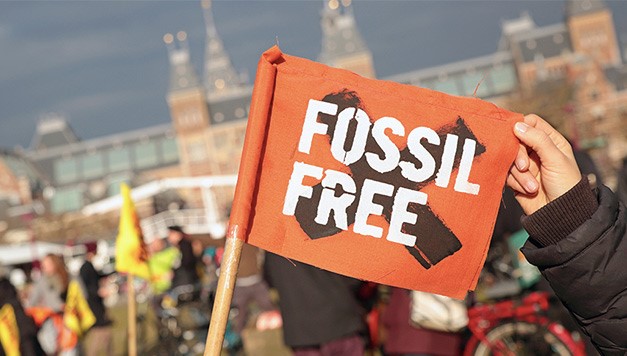Grassroots people of faith and leaders of religious institutions representing more than 1.5 billion persons on Wednesday, November 2, 2022 called for a Fossil Fuel Non-Proliferation Treaty. They released a multifaith letter days before world leaders meet in Egypt for COP27 and with new reports from the United Nations and International Energy Agency (IEA) showing an alarming gap between nations’ climate commitments and those needed to meet the Paris Agreement’s 1.5C goal.

They joined 70 cities, including Kolkata, Los Angeles and London, 101 Nobel Laureates, 3,000 scientists, 1,750 civil society organisations and 500 parliamentarians from Africa, Asia, Europe, and the Americas in calling for an immediate end to new fossil fuel projects, an equitable phase-out of existing coal, oil and gas production, and a generous commitment to a just transition for climate-impacted countries, communities and workers.
They also urged other people from diverse religious backgrounds to sign the multifaith letter, which will be delivered to world leaders at COP27. Religious institutions have led the way on divesting from fossil fuels and playing a vital role in major climate mobilisation.
They join the call for a Fossil Fuel Non-Proliferation Treaty as “government action has been painstakingly slow and catered too much to the reckless and deceptive fossil fuel corporations, preventing meaningful and timely climate legislation”, as stated in their letter.
“Pacific Islanders face a climate emergency which is an existential threat,” said Frances Namoumou of the Pacific Conference of Churches, Secretariat to 10 National Council of Churches of Pacific Islanders who are members of the 600-million person World Council of Churches community, whose recent Global Assembly endorsed the call for a Treaty.
She continued: “We must stop what threatens us and protect those who are most vulnerable. It is the only decent thing to do.”
“The life of Shakyamuni Buddha, the founder of Buddhism, demonstrated both continuous self-development and rigorous engagement with people and their problems,” said Tomohiko Aishima of Soka Gakkai International, a global Buddhist organisation based in Japan. “Continued dependence on fossil fuels, which brings about tragedy, particularly to people in vulnerable situations, is incompatible with our conviction and commitment. We have indicated our support for a Fossil Fuel Treaty.”
With COP27 taking place in Africa, religious leaders and grassroots persons of faith from the continent highlighted the importance of a Treaty.
“Historically and presently, those hit first and worst by climate change in Africa and worldwide have a tiny carbon footprint,” said Sheikh Yussuf Nassur, Religious Leader of the Supreme Council of Kenya Muslims. “Why should these innocent people suffer while the world’s largest corporations and wealthy governments fail to respond adequately?”
“Every day I see small farmers, their families and their animals suffering from the effects of climate change, such as unpredictable rain patterns, drought, heat waves and flooding.,” said Baraka Lenga, a grassroots GreenFaith organiser based in Tanzania.
“Fossil fuels cause over 80% of all greenhouse gas emissions. For the sake of life and to prevent massive, cruel levels of suffering, Africa and the world need a binding agreement that directly addresses fossil fuels and that funds universal access to clean power for the hundreds of millions of Africans who lack access to energy,” Lenga added.
Wednesday’s announcement builds on the Vatican’s July endorsement of a Fossil Fuel Non-Proliferation Treaty. At the premiere of “The Letter” film on October 4, Cardinal Michael Czerny, Prefect of the Dicastery for Promoting Integral Human Development, said: “The global situation is more desperate today than it was seven years ago. Despite the Paris Agreement, its target of only a 1.5°C temperature increase is practically out of reach; the planet is already 1.2°C hotter. Yet many new fossil fuel projects are recklessly being initiated, contradicting the call from the International Energy Agency. That’s why the proposed Fossil Fuel Non-Proliferation Treaty is essential, to complement the Paris Agreement and help implement it.”
Catholic institutions in Latin America and the Caribbean prepared for COP27 with an October Open Dialogue for the Care of Creation, where they also announced support for a Fossil Fuel Non-Proliferation Treaty.
Mon. Jorge Eduardo Lozano, General Secretary of the Latin American and Caribbean Catholic Bishops Council (CELAM), said: “We call on the governments of our countries to urgently initiate the necessary actions to develop and implement a Fossil Fuel Non-Proliferation Treaty as a tool that can preserve the good of our Common Home. Corporations, governments and financial institutions must stop initiating new oil and gas exploration, and replace fossil fuels with energy sources that are friendly to the planet and those of us who inhabit it.”
Over the past six weeks, religious organisations have reached thousands of people of diverse faiths with education on a Fossil Fuel Treaty and have held public actions organised by the GreenFaith International Network in Europe, Africa, the US, Latin America, Indonesia, Australia and elsewhere to protest new fossil fuel projects and to call on the world’s largest asset managers to end support for climate-destructive projects. The Catholic community marked the release of “The Letter,” a film telling the story of the Laudato Si’ encyclical and the unfolding ecological emergency. The film has been viewed by more than eight million people.
With world leaders gathering for the G20 meetings in Indonesia at the same time as the annual UN climate negotiations take place in Egypt, religious communities have resolved to bring their call for a Treaty to the attention of world leaders.
“Religious communities worldwide have supported binding international agreements on nuclear weapons, debt relief, tobacco, land mines, and more,” said Hening Parlan, Environmental Head for ‘Aisyiyah, the Women’s Movement of Muhammadiyah, an Indonesian Islamic organisation with more than 30 million members. “We believe strongly in the importance of a Fossil Fuel Non-Proliferation Treaty and a just transition and we are committed to supporting it.”
